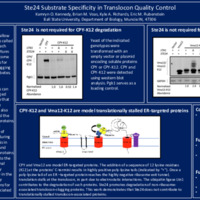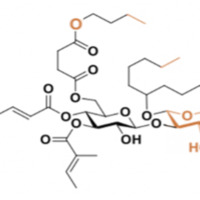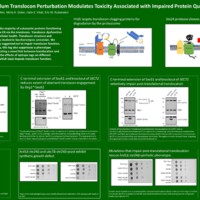Browse Exhibits (81 total)
Joseph T. Trentadue | COVID-19 and Mask Wearing Support
Moral Foundations Theory proposes that there are five moral frameworks through which individuals view their world from: care/harm principles, fairness/cheating principles, loyalty/betrayal principles, sanctity/degradation principles, and authority/subversion principles. Research has shown that liberals are more likely to both endorse and utilize moral arguments that are based on the principles of care/harm and fairness/cheating, whereas conservatives are more likely to endorse and utilize moral arguments that are based on the remaining three principles. The current study analyzed the impact that moral framing could have on individuals who selfidentified as either liberal or conservative in relation to mask-wearing and the COVID-19 pandemic. Participants were asked to complete a questionnaire assessing perceptions of COVID-19 regarding individual concern and perceived threat of the virus. Participants were then asked to complete the right-wing authoritarianism scale as well as the social dominance orientation scale to assess participant’s leanings. Participants were then shown one of three messages regarding COVID-19, framed in either a harm avoidance and fairness moral framework or purity and ingroup loyalty moral framework. Participant’s level of persuasion was then assessed, by assessing how often participants intend to wear a mask and how likely participants would be to support a national mask mandate. Results of this study will contribute to previous research that shows moral framing of statements can influence persuasion among a population that might not be likely to support it.
Faculty Mentor: Dr. Andrew Luttrell
Department of Psychological Science
Undergraduate
Honor's College
Kade Dentel, Cam Dowless, Evan Knapke, Erick Sands | Merit Engine

Financial advisors are increasingly dependent on the digital tools they use to serve their clients. These tools cover a comprehensive domain from portfolio management to client onboarding systems. We developed Merit Engine to explore a new field of financial advising software. Merit Engine offers advisors a method of crafting and visualizing hypothetical investment strategies. This delivers advisors the ability to determine what strategy best fits their clients based on real data visualizations.
Faculty Mentor: Huseyin Ergin
Computer Science
Undergraduate
Kaila Henkin | "Redirecting the Blame
This presentation explores how white power structures use Black women such as in Kiese Laymon's narrative Heavy as scapegoats for the blame of generational and current trauma resulting in abusive tendencies and food insecurities in Black communities. This research presentation also delves into triple consciousness and America's consumption of Black women in and outside of Laymon's novel, including the most recent spark of Black Lives Matter protests this previous summer.
Faculty Mentor: Emily Rutter
Department of English
Undergraduate
Kamryn Kennedy | Ste24 Substrate Specificity in Translocon Quality Control

Translocons are molecular channels that allow proteins to cross membranes in a process called translocation. This enables proteins to reach their appropriate cellular locations to perform their specific functions. If translocons become clogged, they cannot be used as passages for other proteins. Unresolved translocon clogging may result in diseases, such as type 2 diabetes. There are two modes of translocation, posttranslational translocation (PTT) and cotranslational translocation (CTT). Errors can occur in both processes, resulting in clogged translocons. Ste24 is a conserved enzyme that degrades clogging proteins that enter the translocon via PTT. It is unknown if Ste24 also degrades proteins that use CTT. We tested the hypothesis that Ste24 degrades clogged proteins that undergo CTT, using a Saccharomyces cerevisiae model system. The abundance of proteins engineered to clog translocons during CTT was analyzed via western blot analysis in yeast containing or lacking STE24 . We found Ste24 does not promote degradation of proteins that undergo CTT. These data contribute to the knowledge of how cells maintain functional translocons, suggesting translocon quality control enzymes exhibit strong specificity in the types of translocon clogging proteins they degrade. Our results may have implications for understanding and treating diseases associated with translocon dysfunction.
Faculty Mentor: Eric Rubenstein
Department of Biology
Undergraduate
Katelyn Singer | Where's Your Mask? Changes in Distance Perception in Mask-Wearing

This study presented a comprehensive view of the role that psychological resources (such as fear and anxiety) play in distance perception.
Utilizing a novel, virtual approach, researchers asked participants to judge the distance of a series of virtual characters while being depicted as either wearing or not wearing a mask. Participants were also asked to make these judgments under conditions in which the virtual character being depicted was identified as either someone familiar (friend) or unfamiliar (stranger). Participants also completed a demographic questionnaire and a Likert-style measure assessing their level of fear during conditions present in the coronavirus pandemic.
Results of the study indicate mask-wearing does influence participant distance estimates. Participants underestimated the distance of virtual characters in both experimental conditions when the character was depicted as not wearing a mask. Familiarity did not influence distance perception in this study. Age and education level were also found to be correlated with participant fear ratings and participant mean distance error scores in experiment 1.
These findings extend previous research that supports the role of fear in changes in perception, such as making objects closer (Cole, Balcetis, & Dunning, 2013), bigger (Vasey et al., 2012), and appear to move faster (Witt & Sugovic, 2012) when participants are exposed to fear-inducing stimuli. Continued research in this may provide clinical importance as identifying factors that affect perception may allow for better planning and awareness in the instance of other pandemic or mass disease events. Additional research should also be conducted to extend these findings to other populations.
Faculty Mentor: Dr. Daniele Nardi
Department of Psychological Sciences
Graduate
Keldyn Young | Emotional Support Among College Students
This study examined the comparision of percieved emotional support from peer and familial figures among first-generation (N=15) and continuing-generation (N=41) college students. This study also examined the relationships between emotion regulation skills, self-efficacy, and academic achievement with overall preceived emotional support. First-generation college students reported significantly less emotional support from peer figures compared to continuing-generation college students. However, there was not a significant difference in emotional support from familial figures. In addition, there was a strong, postive correlation with overall perceived emotional support and emotion regulation skills for first-generation and continuing-generation college students.
Faculty Mentor: Anjolii Diaz
Psychological Science
Undergraduate
Krista Price | Mindfulness Influences on Information Transfer Between Hemispheres
Extensive research has investigated how mindfulness impacts cognition and well-being. However, there has been no research that has looked at how mindfulness may influence how we process information. Global and Local processing is a cognitive function that helps individuals perceive and conceptualize the world. The current study is a pilot study to establish a trend in mindfulness and Global and Local processing. Participants will be tasked to listen to a 12-minute mindfulness meditation audio, then will then perform the Navon letter task which assesses accuracy for engaging in Global and Local processing.
Faculty Mentor: Thomas Holtgraves
Department of Psychological Science
Graduate
Kwabena Duah, Lauren Andrews | Synthesis of Open-Chain Analogue of Ipomoeassin F

Resin glycosides are the active ingredient in most morning glory-based medicines. They possess numerous biological applications such as laxative, purgative, antibacterial, and antifungal properties. Ipomoeassin F is a novel glycoresin that was isolated from Ipomoea squamosa, and it has a unique structure and anticancer activities with IC50 values in the low nanomolar range for most cancer cell lines. Ipomoeassin F’s mechanism is underexplored due to the structural complexity, large time requirements, and high costs. In order to deepen our understanding of how ipomoeassin F works, decrease cost, labor, and time, we are synthesizing a novel simplified open-chain analogue 1 of ipomoeassin F from readily available D-glucose and L-arabinose. This structure was designed based on previous structure-activity relationship (SAR) studies. Analogue 1 is synthesized by utilizing glycosylation followed by esterification and deprotection reactions to couple the glucosyl donor, (synthesized from D- glucose over 7 linear steps) and the arabinose acceptor (synthesized from L-arabinose over 7 linear steps). Both the glucosyl donor and the arabinose acceptor have been fully synthesized in excellent yields, and the synthesis of analogue 1 is still ongoing. Once synthesis of the target analogue 1 is completed, it is intended to be assayed for biological potentials which could then fuel the design and synthesis of future analogues. This can then be advanced into the field of drug discovery.
Faculty Mentor: Dr. Wei Q. Shi
Department of Chemistry
Undergraduate/Graduate
Honors College
Ky Bray | Computerized Analysis of Linguistic Style Differences Between Offenders of Mass Shootings

Legacy tokens, artifacts written by offenders of mass shootings, provide a window through which violent behavior can be examined from the perspective of the offender. Many previous studies have investigated legacy tokens qualitatively, yet surprisingly few have conducted computerized text-analyses. Further, past work has yet to evaluate text-based differences between types of offenders, principally between those who commit suicide or survive a mass shooting event. The present study intends to use a quantitative approach to exploring these differences by using the closed-content, text analysis software, Linguistic Inquiry and Word Count (LIWC). To accomplish this, legacy tokens will be harvested from an online database, verified by at least one other internet source, and submitted to LIWC for analysis. Legacy tokens between offender types will be compared based on language style categories shown to indicate emotionality, cognitive complexity, and attention allocation.
Faculty Mentor: Thomas Holtgraves
Department of Psychological Science
Graduate
Kyle Richards | Translocation Through the Endoplasmic Reticulum Translocon is Impaired by Translocon Modification

The endoplasmic reticulum (ER) is the entry point for most proteins residing and functioning in the eukaryotic endomembrane system. The primary mechanism by which proteins enter the ER is via the translocon complex. Dysfunction in this complex can block access into the ER, which is detrimental to cellular health. The translocon is highly conserved and has been intensely studied in Saccharomyces cerevisiae. Analysis of translocon function in protein trafficking, localization, and interactions in yeast has been facilitated by the use of epitope tags. We have found that a tag on the translocon pore subunit previously suggested not to impair translocon function subtly affects translocation of proteins into the ER in yeast cells. Intriguingly, this tag also suppresses a phenotype associated with defective protein quality control pathways, consistent with a functional link between translocation and quality control. Ongoing work includes characterizing the effects of placing different epitope tags on different translocon subunits, with the goal of identifying tags that affect translocon function the least.
Faculty Mentor: Eric VJ Rubenstein
Department of Biology
Graduate
